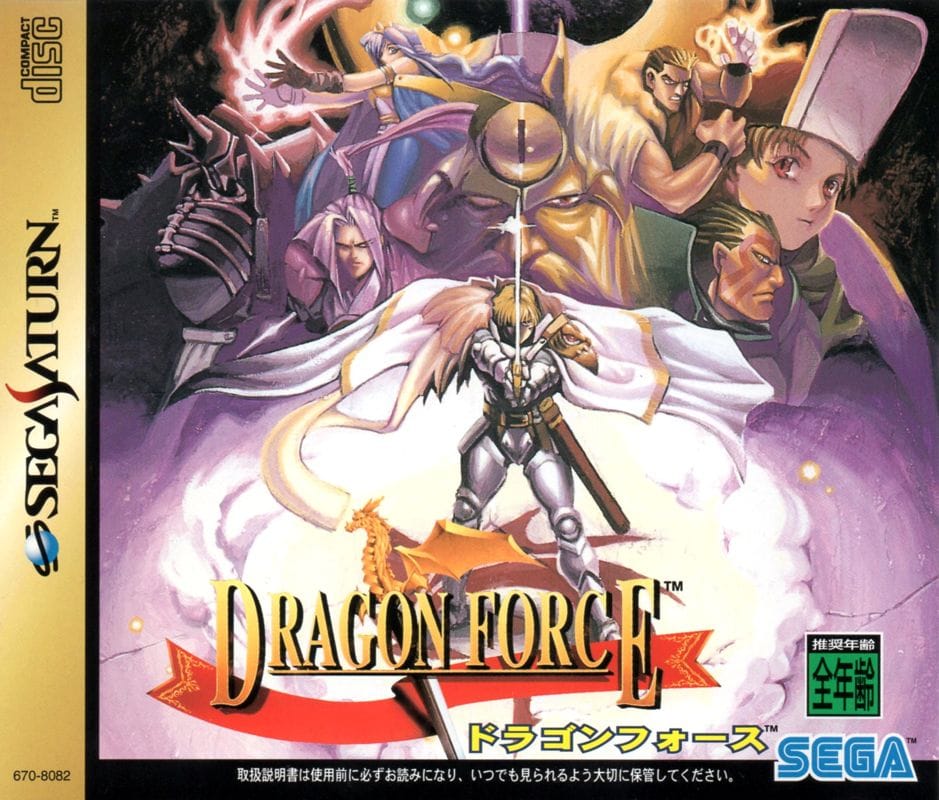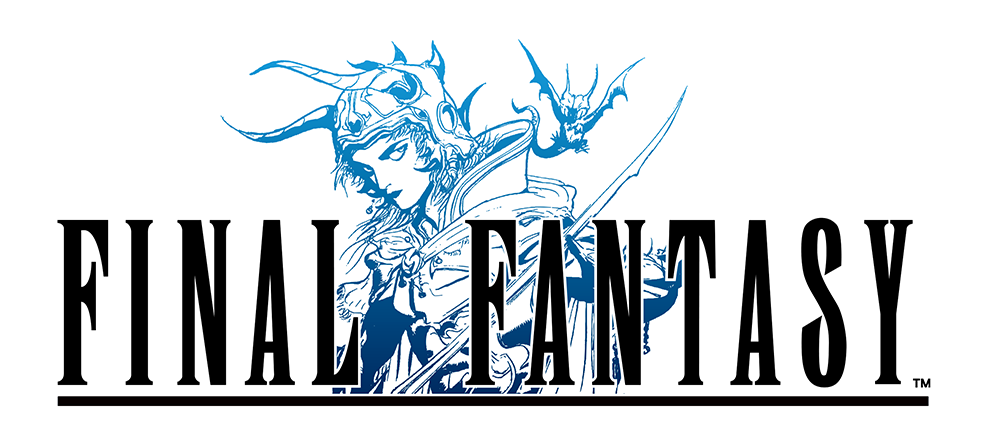My Friendly Neighborhood: Sesame Street Meets Resident Evil
The puppets in this abandoned TV studio have been utterly alone for a decade. What happened to the humans who worked here is vague and unclear– but these life-size living puppets are roaming the hallways in various states of madness.
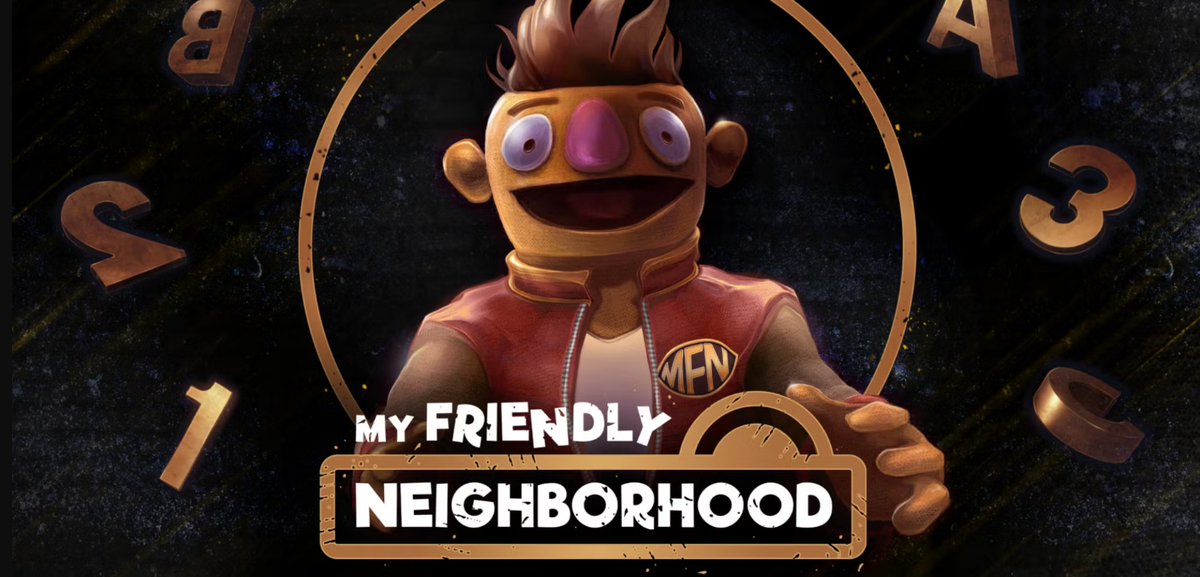
My Friendly Neighborhood is a first-person survival horror adventure game in the classic mode: In alternate-universe 1993, Gordon, a tired, hairy-armed, no-nonsense fella from the Bronx, is sent to the abandoned City Network Hotel in the heart of the grimy, dark City, to shut off a mysteriously-activated TV signal. The TV tower hasn't been used for a decade and there's no reason it should be suddenly broadcasting episodes of a long-cancelled children's puppet show. Gordon's boss dispatches him to do one simple task: get to the top of the City Network building and shut off that glitched signal.
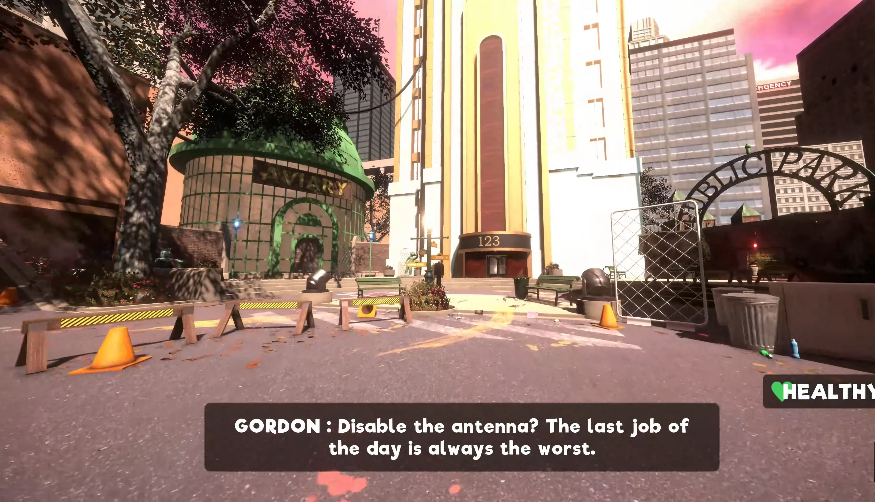
When he arrives, however, at the trash-filled and gritty parking lot in front of the City Network Hotel, Gordon is perturbed to find that not only is the whole building pretty much locked up, but there is a very sentient sock puppet waiting to greet him and ask for help. He introduces himself as Ricky. Ricky is surprised that Gordon is here to disable the studio's antenna, but he reluctantly allows Gordon deeper into the building; and right away we feel... something might be wrong with this guy. He's chipper and cute, but his cheerfulness borders on mania and his helpfulness has a bit of an edge to it.

I'll just say it right off the bat: In the world of My Friendly Neighborhood, animate and sentient puppets seem to be a given. Gordon isn't terribly shocked by having a conversation with a wiggly-eyed sock puppet that extends infinitely from pipes and boltholes around the building. As Gord says repeatedly, he's just tryin' to do his job. But as he slowly works his way from locked room to locked room, picking up strangely-shaped keys, fragments of notes, and other items, he starts to feel like the whole building is working against him. Why is this empty, echoing building suddenly coming back to life? Where are all the people? And why can he hear muttering, giggling, blathering voices coming from other rooms?
Influence and Aesthetic
I was a child of the 80s and a resident-in-spirit of Sesame Street, along with hundreds of thousands of other toddlers that learned their ABCs from that brilliant and groundbreaking show– the first of its kind to actually utilize childhood psychology, multi-layered clever writing, rapid-fire humor, and masterful visual craftsmanship to educate the TV generation. Jim Henson was a workaholic and perfectionist, but he was also a once-in-a-generation artistic genius.
For many of us young Americans, glued to the acrylic carpet in the family room, gazing up at PBS in our preschool days, the only exposure we got to the culture and vivacity of New York City was through the low-res, gentle embrace of Sesame Street. I've put a whole episode below from 1980.
I never saw a real Brooklyn brownstone until I was in my 30s, but they didn't feel fresh and exotic to me at all. I'd seen them for years in New York shot media.
The main character of My Friendly Neighborhood, Gordon, may be a tribute to 'Gordon Robinson' (first played by Matt Robinson), one of the original human cast members in 1980s Sesame Street. MFN takes place in 1993, so there are a ton of stylistic and aesthetic choices that reference classic 70s and 80s children's television programming, from fonts to props.
Unlike movies, where directors and propmasters might just use what's nearby to fill the scene, it is quite a bit harder to do this in a video game– especially one as thoroughly artistically consistent as My Friendly Neighborhood. Every artistic aspect of this game looks, sounds and feels very carefully chosen.
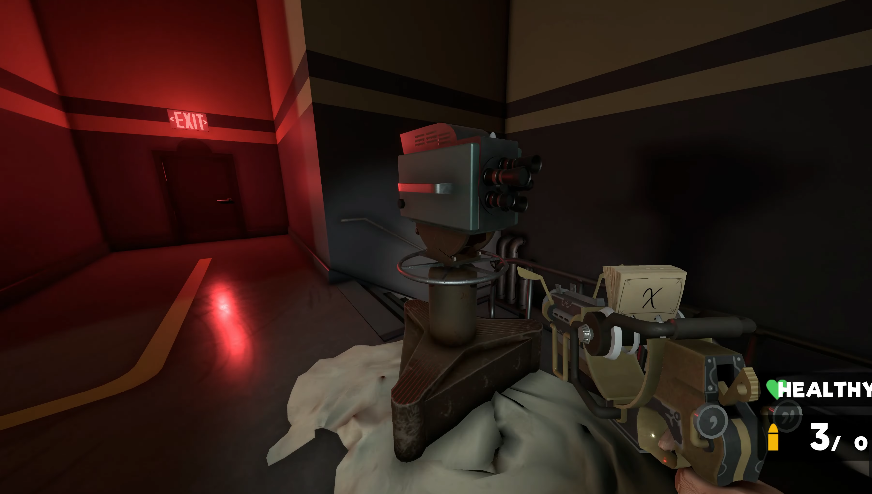
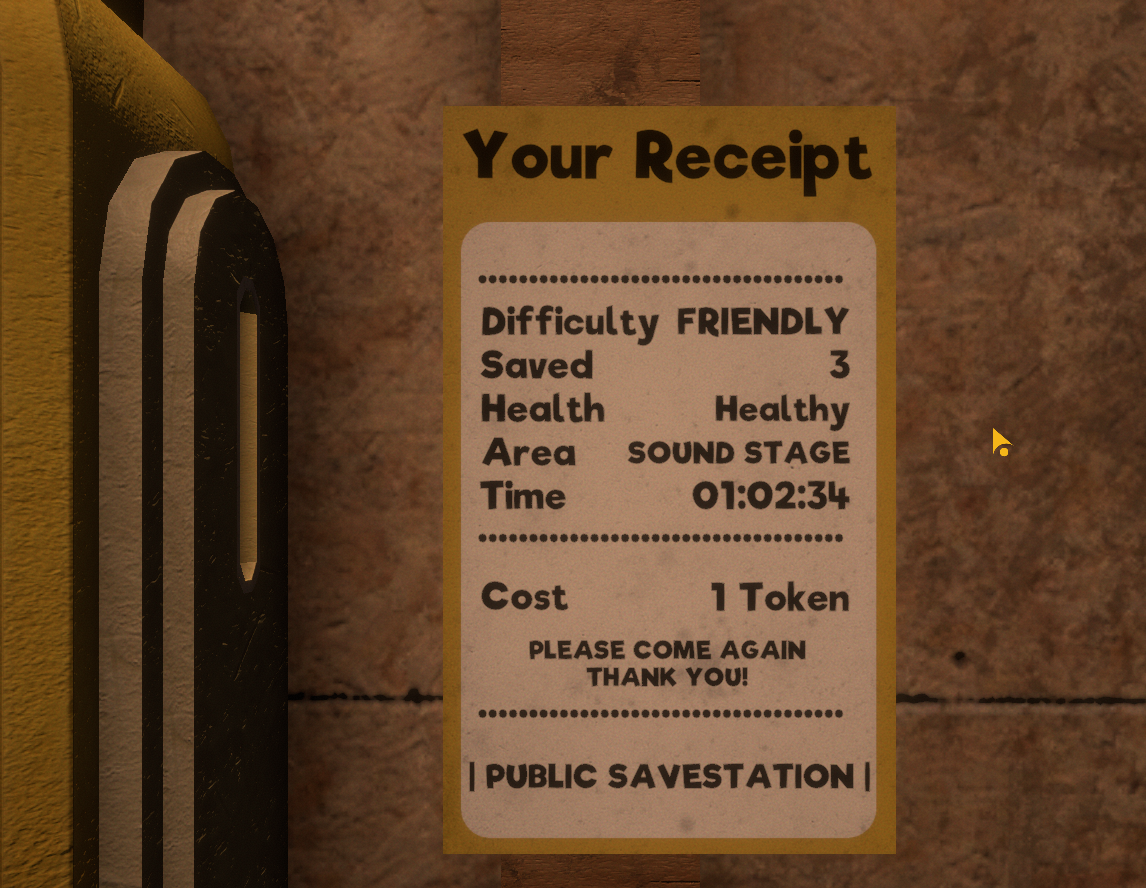
The first instance that really struck me was the save mechanism. Like Resident Evil with its typewriter ribbons (why are they so fragile? Why are they so sparse??), saving in this game is not automatic and not infinite– you pay for every single save (and health refill) with tokens, a limited resource. Save machines ('Public Savestations'--are these a normal thing in this City?) are located in certain safe-rooms sprinkled around the building, and Gordon pops in a token, yanks the slot machine style handle, and a cardboard ticket pops out with an absolutely delicious Chunk-Crunch! Pok! sound.
Just look at that thick, scissor-cut, irregular font. Look at that dirty, greasy paper texture! This font reminds me of every single thing this game is trying to evoke: the hand-made, hippie-dippie imperfection of the 70s; an elementary school teacher's awkward attempt at cutting out letters from paper; a science museum display; the modernity of sans-serif fonts, but with totally inconsistent terminal ends. The capital A has bottoms that go in two different directions, the C has a wedge taken out of it (rather than two perfectly horizontal ends), the top of the T is a parallelogram, and the kerning is all over the fucking place. I ADORE this font, in this game, giving exactly this vibe. It's perfect.
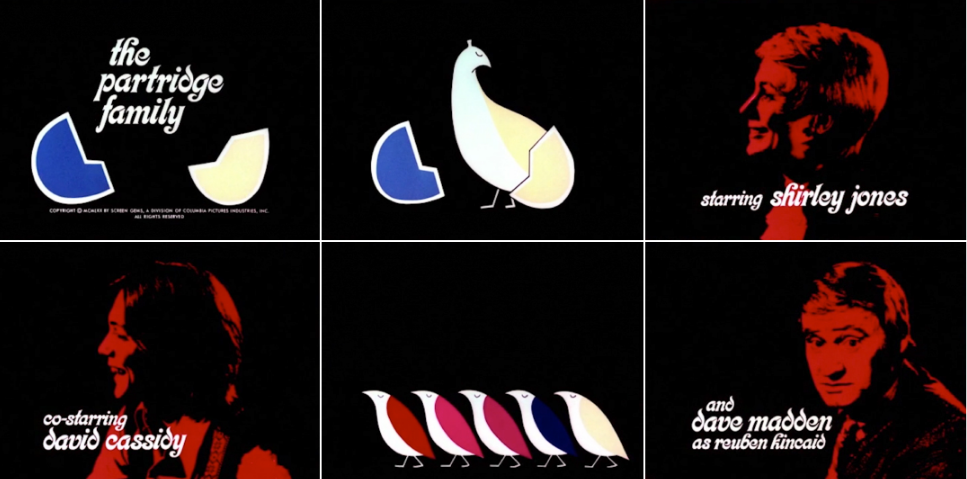
"Just a minute," you say. "Back this bus up. Did you say safe rooms?"
I did.
"Why do we need safe rooms? What did you not mention? ARE WE IN DANGER?"
Oh stoppp, of course not! Anyway, grab your tool box with limited inventory...

"I really feel like you've tricked me into playing Resident Evil and didn't tell me. Are there gonna be dangerous, jump-scare-style zombies that pop out of nowhere and throttle you?"
Whaaaat? Noooooo. Okay, yes.
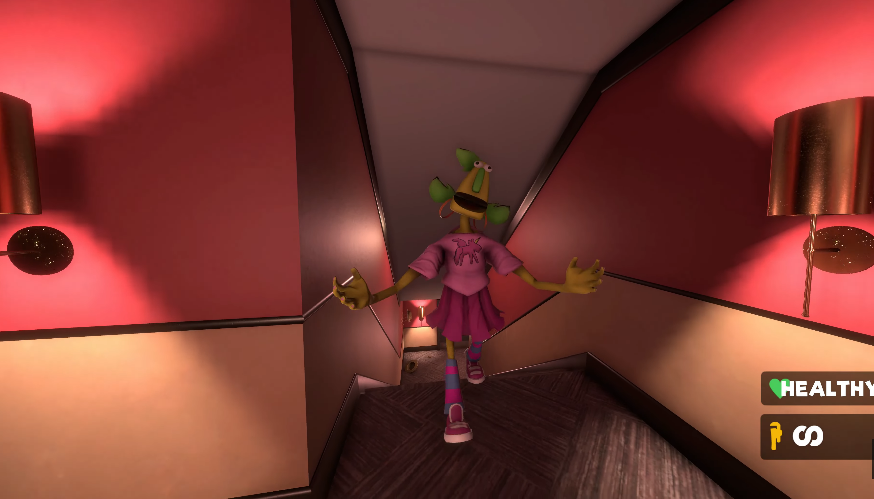
Help!
The Puppets
The living puppets in this abandoned TV studio have been utterly alone for a decade at least. What happened to the humans who worked here is vague and unclear– but these life-size living puppets are roaming the hallways in various states of madness. All of them talk endlessly to themselves, repeating phrases, stories, and songs, corrupted leftovers from their previous lives as educational entertainers. Their voices are falsely cheerful, panicked, laughing. Some puppets are stuck in behavior loops– smashing their hands against a blank wall, hitting a pipe, standing in a corner, slamming a piano discordantly. The first one we approach shouts "A friend!" and rushes bonelessly to grasp you in his unbreakable, crushing felt embrace. The way the puppets are animated in-game is genius: they wobble, they flop backwards on a broken spine, they sag and flail, they lurch, and they NEVER, EVER stop talking.
There are about a half dozen full-size, galloping puppet characters that appear everywhere in this game and can kill Gordon. Many are just minding their own business until you approach.
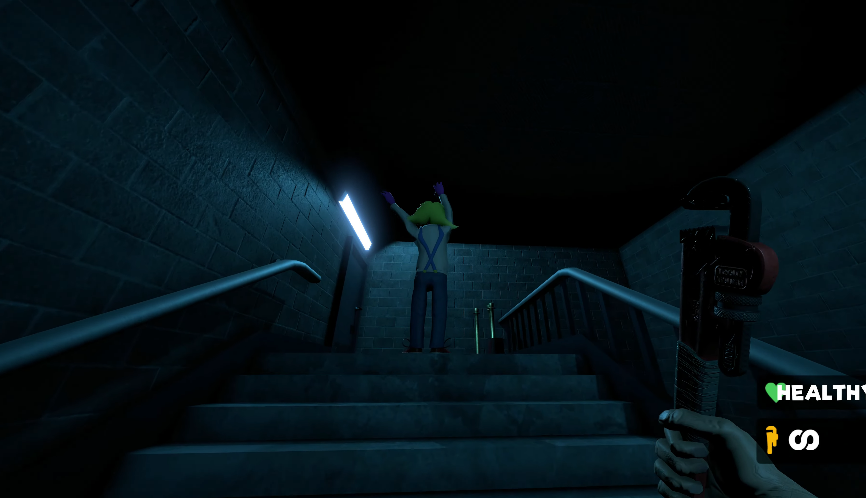
While they stand around, waving their arms, they are– as I mentioned– CONSTANTLY talking. These puppets have gone mad, and they're still ruminating on the lessons they used to teach, in enthusiastic voices. I spent ages just creeping up behind puppets to eavesdrop on their twisted reflections. Then after laughing myself silly, I started taking them down verbatim so I could write this article.
"If you can draw, you can do all sorts of things! Grab your pencil, and let's go on an adventure! So first, make a big, big triangle. Take your hand, make three lines, and connect them together! Okay, now draw a line right down the middle. Wow, that looks great! Now put a circle right beneath it. Wow, see? You made the international hazard sign. Tape that to whatever door your thermonuclear waste is in. Let's try again, but make the biohazard symbol instead! Hee hee!"
"The mail? The mail comes every day! I look out the window waiting for the moment it appears. And then when it does, I rush outside to see what I got. Sometimes it's little pieces of paper. Sometimes it's big boxes. No matter what I always open it immediately. My favorite new pair of socks? I got it in the mail! A letter from a dear old friend? I got it in the mail! An assortment of the best bugs the world has to offer? Well, that one just appears in my house. Mashed skunk cabbage? IN the mail! My neighbors stuffed in a box and shipped to my house? In the mail! The stockpile of greasy hamburgers that I cooked at my vacation home? Come on, say it with me! It came from Florida in the mail!"
"Sleeping can be the best part of your day. I always start by getting ready for bed. I get my PJs on so I can be warm and comfy all night. Then I go to the bathroom and grab my toothbrush. You can put any of your favorite condiments on your toothbrush. I choose mayonnaise. Then, start brushing your teeth! Get every single part of your mouth covered, and scrub the mayonnaise deep, deep into the skin of your mouth. Then when you're all done, leave it, so it can leave a protective layer during the night. Now you're all ready to go! Sleep well, I'll be thinking about you!"
Skip to 6:17 for the monologues.
The handpuppets, with their squeaky little Elmo voices, had me absolutely in tears. Please play this at my funeral.
"I have biiig friends, smalll friends, laarrge friends, laarrrgest friends..."
The theme of innocence and happiness corrupted runs throughout this game from beginning to end. While the puppets appear at first to be absolutely terrifying monsters that crush Gordon to death, the weapons Gordon uses for defense (office equipment based weapons like a gun that shoots Rolodex letters, or typewriter keys, or duct tape) only temporarily disable the puppets– they don't die, explode or burn up. Once a puppet is downed by shooting large brass alphabet letters at its noggin, Gord can wrap them in duct tape (another limited item) and leave them there. That puppet will stay exactly where he left it for the remainder of the game, but unfortunately there are many iterations of each puppet scattered all over the place.
Part of the gameplay is trying to figure out what hallways and corners you'll be traversing regularly, and disabling the puppets that make those areas dangerous.
Some puppets don't look human at all (or never did?), and sometimes Gordon realizes he has an item or opportunity to help the puppet instead of shooting it. An excellent example is the giant Big Bird-like puppet that stomps around the gorgeously rendered main street set.
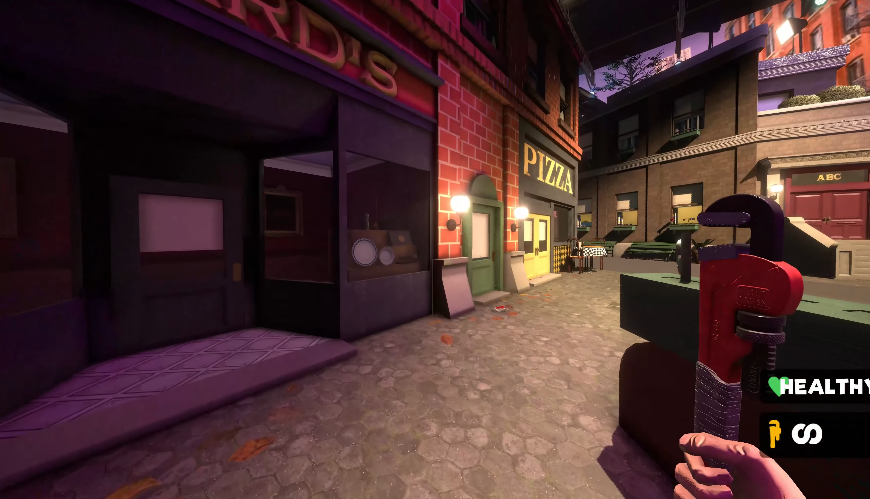

This bird will chase you down and stomp you to death if she gets near you– but if you hide, you can watch her walking a peculiar path. She walks from corner to corner, leaning her beak close to objects and tilting her head a few times. Her beak snaps and nibbles. But if you stay still, you are maybe safe.
At some point we find out that the bird monster is not just a monster. Her name is Pearl. From the initial perspective of pure blank terror at hearing the floor-shaking footsteps of a huge beast running to crush you into jelly, we pull back slightly and reassess. Is she a puppet character? Could she talk?
Gordon ends up finding some humorously triangular glasses– with eyes attached– which you can leave for Pearl to find. She puts them on and her anguish is assuaged.

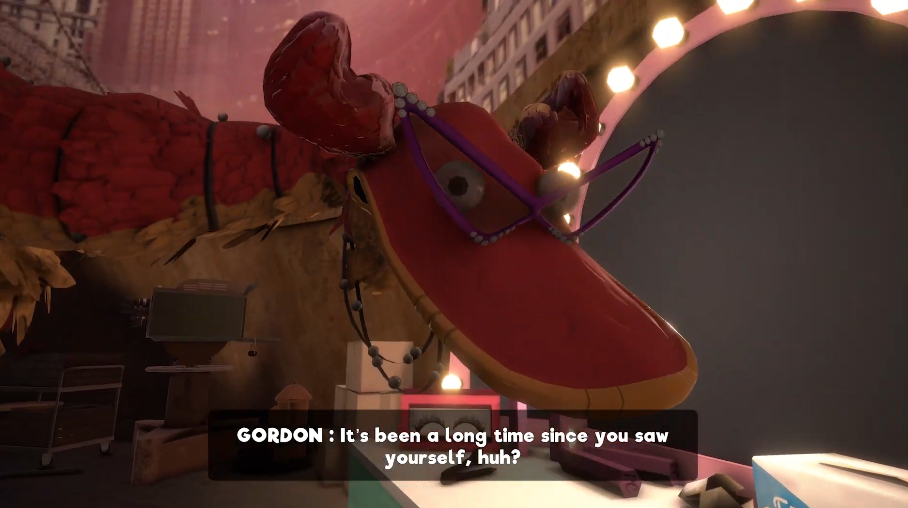
Gordon
We don't get to know a lot about Gordon. Poor, tired Gordon. He's on his last disciplinary notice, he doesn't really love his job, and he's on his last job of the day. Unfortunately, this one is way more complex than he anticipated.
As the game goes on, and as Gordon runs, shoots, puzzles, and encounters unthinkably creepy puppet-based violence all night long, he slowly reveals a little more of himself. I want to point out that Gordon's voice acting is just as splendid and masterful as that of the hyper-crazy puppets. He's gruff and grumpy, but occasionally he takes the chance to open up to a puppet when he sees it's suffering and not attacking him immediately.
The underlying mystery of My Friendly Neighborhood is, Why did these friendly and happy puppets go off the air? Why did they go mad in their long seclusion? And why are they attacking Gordon?
We get a small hint here and there: Gordon says that he was in "the War", and that he has forgotten a lot of the positive moments of his childhood. In a game that tricks you into thinking it's a Five Nights At Freddy's screaming romp of shooting and explosions, it suddenly pulls back into a quiet, emotional moment. Gordon sits down beside a weeping monster puppet in a theater. He seems to be piecing together the theory that these puppets have been watching movie reels, frightening war footage, violent images of a human world they didn't know existed. They thought they were helping children learn in a world that is kind and pure, but they've been left alone, and thrust into horrible knowledge they weren't prepared for, with no one to guide them.
Gordon sits down and speaks to a weeping monster, baring his heart in a moment so startlingly poetic it has stayed in my mind even long after I stopped playing.
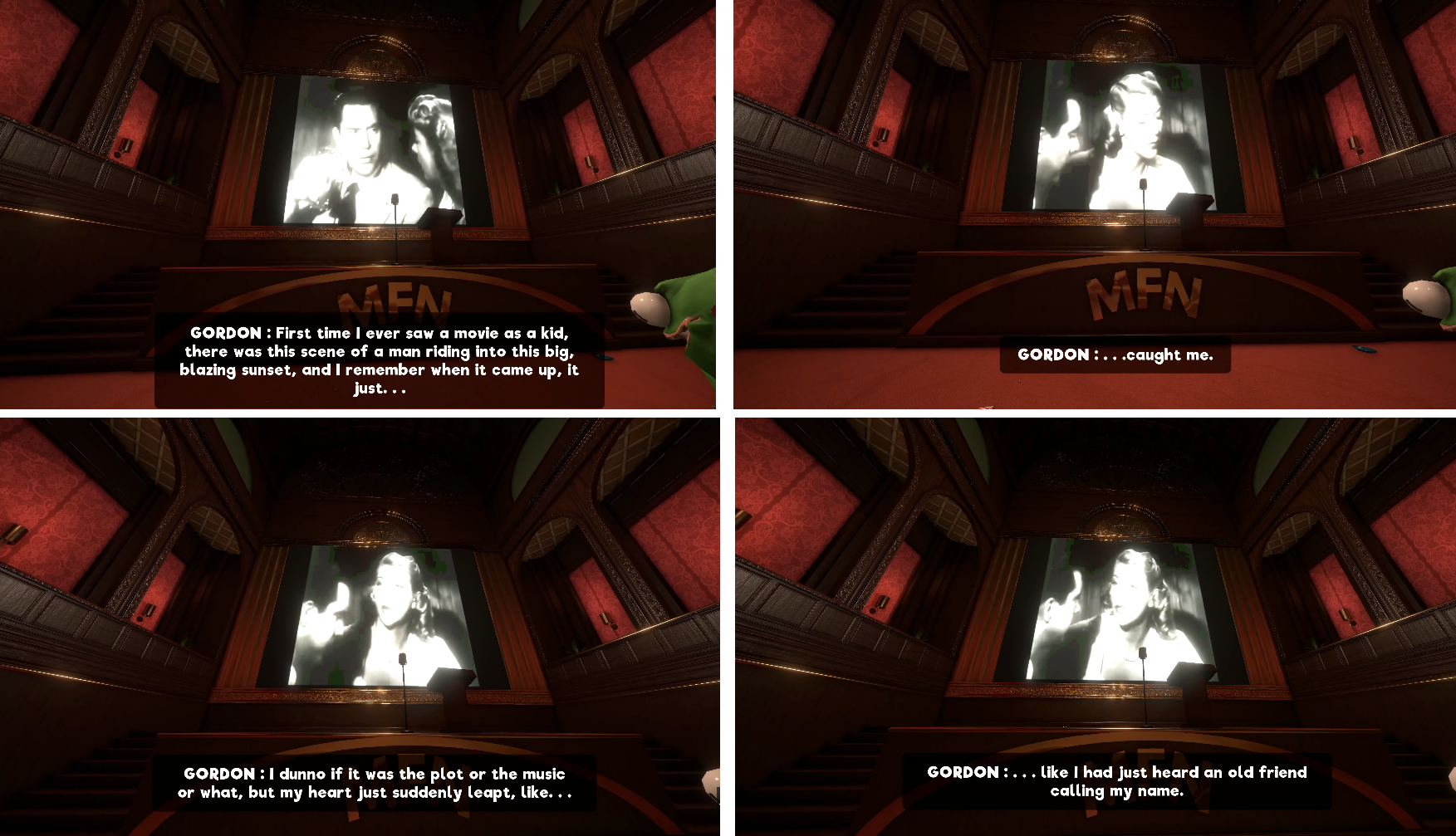
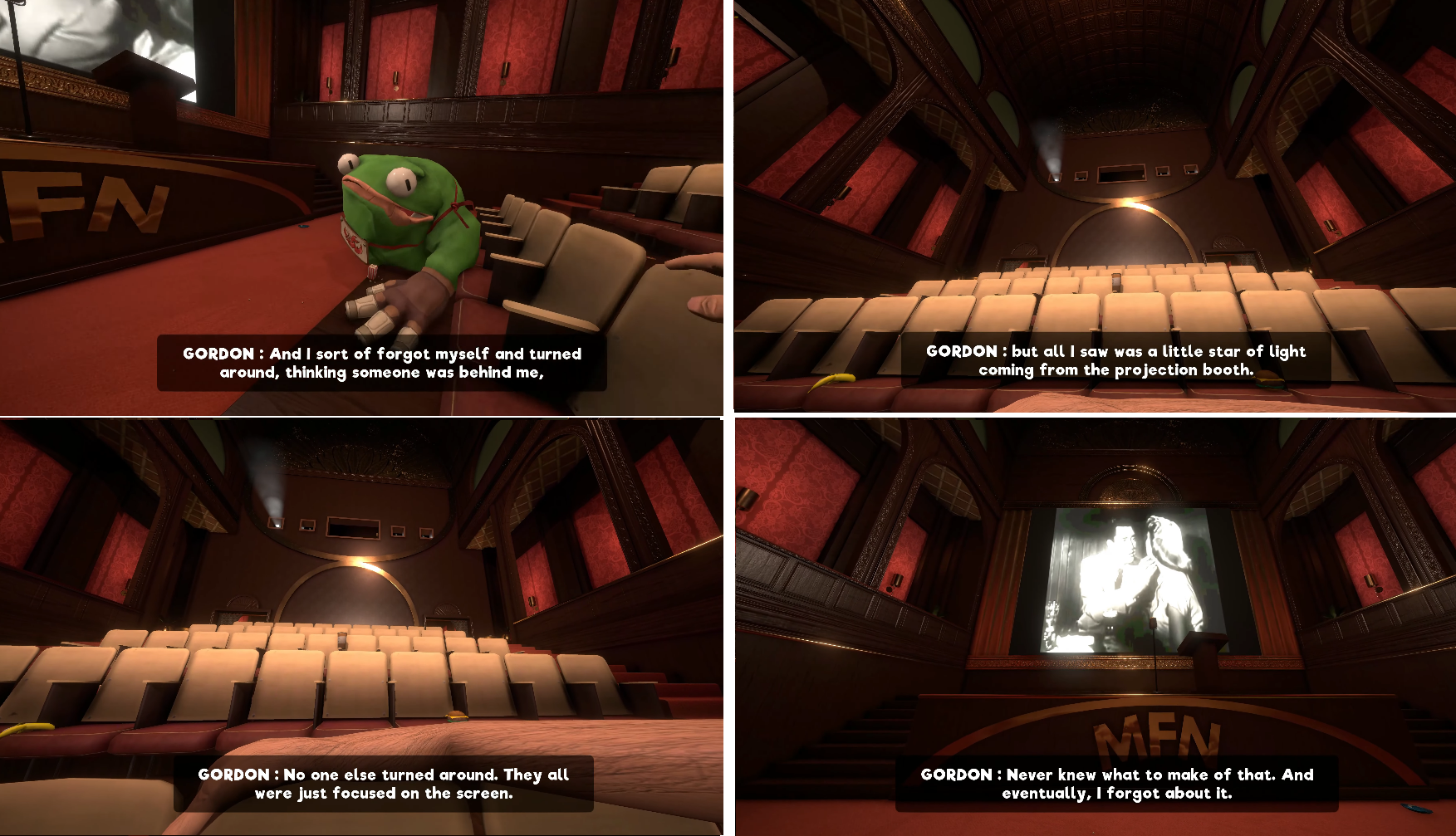
"But it just came back to me now," he says thoughtfully, and the monster is soothed by his openness, this vulnerability that a gruff old soldier shows, revealing just the glimmer of the heart of an artist.
Gordon is ultimately given a chance, a choice: even though he was sent here to turn off the TV broadcast, even though the puppets have been trying to crush, strangle, squish and stomp him ever since he arrived, even though his boss is really pissed at him, even though it's not his responsibility and not his job; Gordon can help the puppets if he chooses to.
Is the City really too far gone to watch a dumb, twee, over-saccharine, optimistic children's show, even if he leaves it on the air? Does anyone give a shit about optimism and listening to other people, or talking about their feelings, or showing tenderness? What good would it possibly do to put a defunct, old, naive TV show back on the air? This is 1993, and the City is reeling from war and capitalism that has gentrified and crushed the population, and acts of misery and violence are absolutely rampant. Gentleness and kindness are gone, man! Who could possibly be interested in watching a show that is just about love, friendship, acts of kindness, and crayon colors?
I've always tried to present a positive view of the world in my work. It's so much easier to be negative and cynical and predict doom for the world than it is to try and figure out how to make things better. We have an obligation to do the latter.
-- Jim Henson
Maybe Gordon's life isn't over yet. Maybe he has a bigger role to play. If that little spark of poetry is still alive in him, maybe there's a place for him to do good, even mired in an environment of fear and defeat.
He admired the job of the man who walks along the road picking up trash with a long stick. He thought that guy had a great job, walking along with a stick, enjoying the road, and doing only good in the world, with hundreds of small actions.
-- Lisa Henson about her father, Jim Henson
Personal rating: 9/10. My Friendly Neighborhood can be speedrun in just a few hours, or you could spend many days trying to untangle the puzzles, but none are extremely challenging. Awkward combat relieved by top-tier voice acting, a fabulous script, and gorgeous artistic styling and vision elevate this game beyond its genre.
My Friendly Neighborhood, developed by John and Evan Szymanski, is currently available on Xbox Game Pass Ultimate, Steam, and PlayStation Store.
